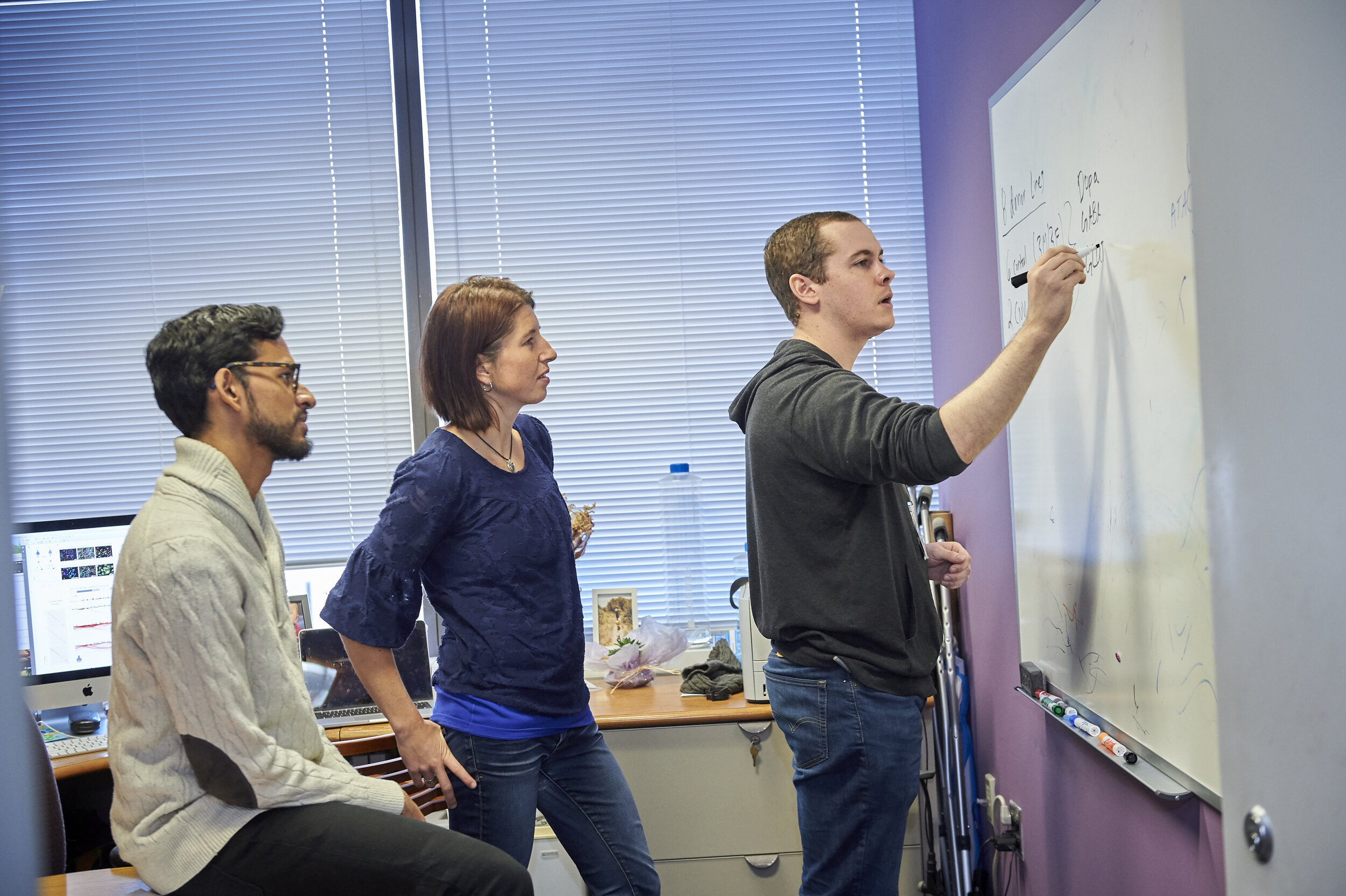
mentoring
a few words about mentoring:
“Science is a team endeavor! I encourage everyone in our group to think of their project as 80% their own. This confers clear ownership, but also reminds each team member that a critical part of their work will be better completed by others. Always help your lab mates as you are able, as you can never be sure when you will rely on them. It follows that 20% of each person’s time should be spent helping others. I am constantly surprised by the insightful ways my trainees have found to enhance and accelerate the work of their lab mates.
Mentorship comes in all shapes and forms: from me, but also your thesis committee, our collaborators, and your lab mates. Take advice and support from everyone willing to provide it. Soon, it will fall on you to help others.”
For the graduate students:
As a graduate student, you are in the early stages of training for your future career. I remember well how anxious I felt as a new graduate student about to get started on my thesis project. Rather than starting and failing at twenty high risk experiments in your first year, I love to see new students develop skills and confidence. I encourage each first-year graduate student to team up with one more experienced lab member for the first year. This will provide a “safe” project through which they can acquire necessary techniques for what will prove to be their thesis project. We work together in this first year to explore, define, and evaluate the feasibility of a larger thesis project.
Never disregard your value to the lab. Your stay will ultimately exceed that of the post-docs working here now and you will soon become the most senior member of the laboratory. While it is easy to be intimidated by the expertise of the post-doctoral scientists, my goal is to ensure that your skills match theirs by the time you defend your thesis.
Please keep in mind that a PhD is really only about learning realistic expectations. Most experiments will fail. Do not just try something, watch it fail, and then try again and again. For anything important to your research, work with me to plan at least three strategies . Move forward on all three in parallel, modifying them with each failure, and only dropping them when it becomes clear they cannot work. If things are going wrong, seek my help… And when things are going well, enjoy your hard earned successes!
For the undergraduate students:
During your college years, you are starting to explore what a future as a scientist may look like. While taking classes and discovering who you want to be, we can help by training you in some skills and research areas that might excite your interest in pursuing a career in the sciences.
For the post-doctoral scientists:
As a post-doc, you are in the final stages of training for your future career. Your primary responsibility is to communicate with me the resources you need to conduct your science. Over the next few years, I will work with you as best I can to help you identify which trajectory (academic research, industry, scientific writing, teaching, consulting, etc) best matches your passions and skills, and then connect you with any contacts I may have who might help further you along your chosen path. I remember well how hard, stressful, and uncertain the post-doc years can be, so I promise to do what I can to make your time in the laboratory as productive and balanced as possible.
When first joining the lab, I encourage new postdocs to dive into laboratory work quickly, even if this means temporarily pairing with a more team member, in order to gain the relevant skills for your future project. We will work together to establish two complementary projects: if one is particularly innovative and risky, the other should be more straightforward and easily completed.
You are among the senior members of the laboratory. I expect you to model a strong work ethic, collaborative attitude and the highest level of scientific rigor to the graduate students in our group.
For the post-baccalaureate scientists:
As a post-bac, you have the opportunity to focus on career development while applying to graduate school. Whether you are interested in MD, PhD, MD-PhD, or other programs, this is an exciting time to focus on where you want your career to take you. We will work with you to craft an application that tells your unique story for admissions committees. This is also the beginning of your scientific and professional career so we will also work together with your daily mentor to train you on protocols, professionalism and developing own project.
To ensure that we all share a work environment that is inclusive, safe, productive, and supportive, all team members commit to upholding our code of conduct.
